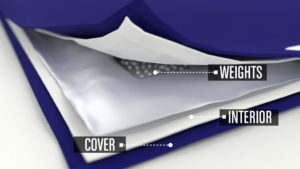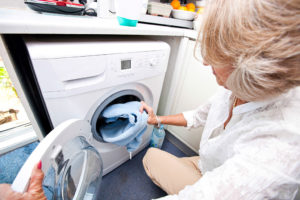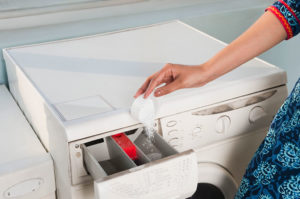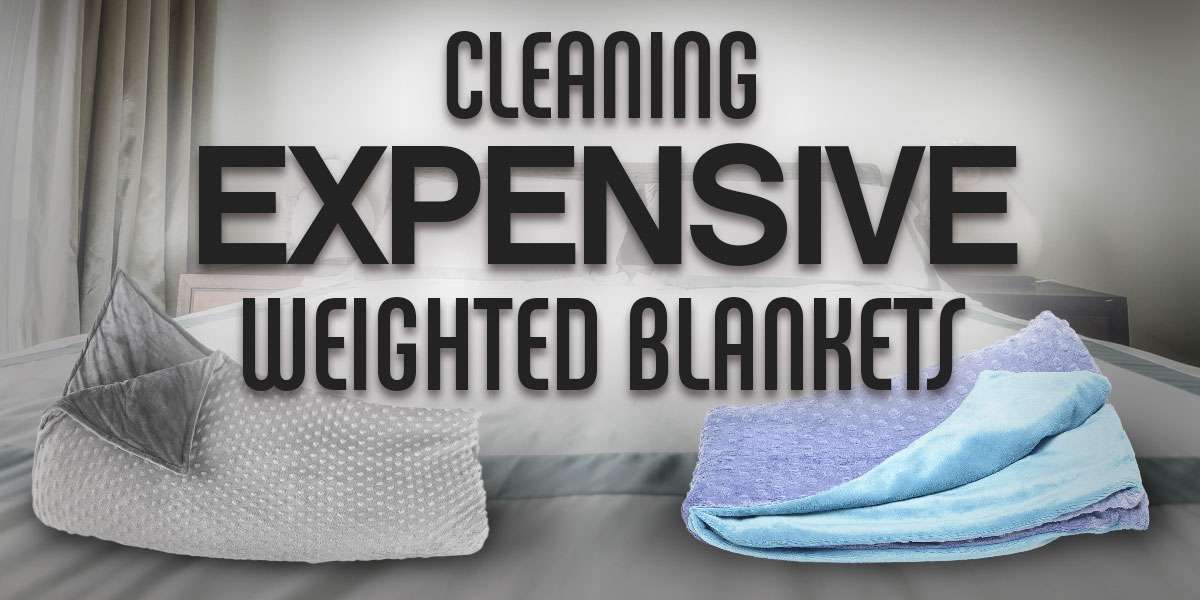What first attracts many people to using a weighted blanket is its wide spectrum of uses. With the ability to treat poor sleep, chronic pain, anxiety, depression, and other conditions and disorders, weighted blankets have a little something that can appeal to everyone.
But unfortunately, many folks learning about weighted blankets for the first time can be put off by the price tags they see, and the sticker shock becomes a hurdle they simply cannot pass. They pass on these amazing blankets because they seem expensive, but if they understood why it may not be an issue in the first place.
So the question is this: why are weighted blankets so expensive? Simply put, it’s because they have more “parts” to them than standard blankets. It’s primarily a combination of two different factors—parts and labor. However, marketing plays a role in it as well. Weighted blankets aren’t commonplace in brick-and-mortar stores (yet), so specialty manufacturers sometimes market them solely as medical or luxury items, using that to justify an increased price.
In this article, we’ll take a look at what impacts the price of weighted blankets and how you can maintain them to get the most out of the money you spend.
Weighted Blankets Are Complex

It’s easy to be tricked into thinking that blankets are simple things. For most of us, they’re just fabric filled with stuffing, and they carry only one function: keeping us warm and comfy. There is a misconception that weighted blankets are just heavier versions of what we curl up with every night. But there are more to weighted blankets than what meets the eye.
There are three parts every weighted blanket needs: the cover (or exterior), the interior, and the weights. Makers can add additional components as a bonus, but these are the only three that are absolutely needed for a weighted blanket. That said, what makes each part can vary wildly in terms of materials used which, understandably, affects the final price. Let’s take a look at each part, how it’s made, and what materials are commonly used to make them.
The Cover
You want the part that you come in direct contact with to be as comfortable as possible. 100% content is what’s most commonly used to make covers. Not only is it easy to clean being machine-wash safe, but everyone is familiar with the touch of the fabric already, so there shouldn’t be any textural discomfort when switching to weighted blankets for the first time. In order to be cleaned the covers must also be removable, which is usually done with a zipper.
Covers rarely get complicated in terms of design, but fabric choice can raise the price. Bamboo viscose is a great example of this: because of how breathable the fabric is, it’s something of a luxury. Buying just a bamboo viscose cover without the rest of the blanket costs almost $100. The first step in finding an inexpensive weighted blanket is sticking to fabrics you’re already familiar and comfortable with.
The Interior
The unique traits of a weighted blanket lie in the exterior. Because it needs to help retain heat as well as hold the weights in a specific way, a great deal of effort gets put into an interior’s design. As with covers, the most common fabric used inside weighted blankets is cotton. It’s fairly rare that manufacturers will use something else; unlike the exterior, the texture doesn’t matter as much to consumers.
While not the most expensive part of the weighted blanket to produce in terms of materials used, it’s here where labor costs spike. The interior of the blanket must be divided into a series of sections separate from one another to hold the weights. Each of these sections holds several weights (see the next section), and ideally the seamstress will measure the pouches so that they hold the weights in place with minimal movement. As you can imagine, this is a very precise, time-consuming process, but it’s needed to achieve the equal weight distribution that delivers all of a weighted blanket’s benefits.
From a consumer standpoint, not much can be done to reduce the cost of the interior. If you do encounter a weighted blanket interior (or a weighted blanket sold without a cover) being sold cheaply, be cautious: the low price could be indicative of poor workmanship.
The Weights
Also known as the filler, these are the actual weights that give the blanket its heft. Each individual weight is small and stuffed into pockets of the interior. The overall weight of a blanket will vary depending on who makes it, but buyers are advised to find one that weighs anywhere between 10-15% of their own body weight. And, as mentioned above, the individual weights shouldn’t have much space to shift around.
Fillers tend to be glass or poly (plastic) beads, though organic materials like sand and rice are occasionally used. Each one has its own strengths and weaknesses, but a general rule of thumb is that organic materials are cheaper because they don’t need to be manufactured. However, they’re often less efficient at equal weight distribution because they aren’t uniform in size. If you do choose to go with an organic option because it costs less, know that you’re risking a potentially uncomfortable experience.
What About Size?
It makes sense that a larger blanket would cost more money, but understanding how weighted blankets are meant to be used and measured could help you save a nice chunk of change. Unlike traditional blankets, which we love to have draping the edges of the mattress, a weighted blanket should only be big enough to cover your body with a little extra space. Using a weighted blanket that fits your mattress doesn’t make it any more useful.
Shipping Costs
Currently, the majority of weighted blankets are sold online directly from the manufacturers. As a result, shipping costs can become an issue. Unless you’re specifically buying a specific brand or a blanket with unique features, try to buy as close to home as you can.
As an aside, there are a number of companies in China producing weighted blankets at extremely low cost. While obviously appealing to the price-conscious consumer, buying consumer goods from China comes with tremendous risk. The country has significantly less oversight and quality control than others, leading to products made with little durability and even potentially dangerous materials. Don’t let a good deal blind you to these dangers.
Marketing
As mentioned previously, the many uses weighted blankets can have has resulted in them being sold in different ways. You could have two weighted blankets at different prices, one advertised as treating chronic pain and another that helps lower anxiety, but they wouldn’t necessarily be different. It’s the same application of weight that relieves all of those symptoms, so why are they priced differently?
It comes down to the idea of specialty. Manufacturers can make extra money by marketing towards specific problems and consumers. Though they’re essentially the same, a blanket sold as a medical tool rather than a general purpose item can come with a higher price tag even though there may not be anything special or unique about it. If you’re willing to spend more time shopping around, you can save money by finding a quality weighted blanket without specialty marketing.
Keeping Your Weighted Blanket Clean
 Now that you know just what goes into a weighted blanket, you probably suspect that cleaning one is is a bit more involved than simply tossing it in the washer. Thankfully, it’s not too difficult of a process, but it does require you to be extra careful. Also, lest you ruin your investment so soon.
Now that you know just what goes into a weighted blanket, you probably suspect that cleaning one is is a bit more involved than simply tossing it in the washer. Thankfully, it’s not too difficult of a process, but it does require you to be extra careful. Also, lest you ruin your investment so soon.
How you clean your blanket, as well as how much of your blanket you can clean; depends largely on its materials and weight. Manufacturers are usually kind enough to include detailed instructions for washing, drying, and generally caring for your blanket, but if you decided to purchase a custom made a blanket, or if there simply were no instructions included, here’s are some general tips to follow.
Removable covers save time
The cover (or duvet) is the blanket’s first link of defense against all forms of stains. The more that you use your blanket, the more likely it is to get dirty. Rather than having to wash the entire blanket every time; you can choose to remove just the cover and clean that instead. You can send it for a gentle ride in your washing machine or spot clean it yourself with your preferred cleaning agent.
Consider a laundromat for the blanket itself
No matter how heavy or light your weighted blanket may be; the additional weight it carries can cause real stress on your washer and dryer. To help maintain those appliances and your blanket; it’s worth the extra time and money to wash it at a nearby laundromat. Their commercial-sized washers can handle the extra weight no problem.
Wash the blanket in its own load
It’s not just a matter of additional weight: additional items in the same load could pose a hazard to the blanket. Anything with metal buttons and zips can snag on and tear the blanket. Also, makes it less durable as a whole and potentially spilling some of the filler.
Remember your filler
Whatever your blanket uses for weight can also determine how you wash and dry it. Glass or plastic beads don’t pose an issue since they don’t absorb water and will dry easily. Fillers like sand and rice, on the other hand, are much more of a hassle and shouldn’t be machine washed at all. Instead, you can try to spot clean them as needed. But ultimately they should have as little contact with water as possible.
Machine dry or air dry?
 Both methods are viable options, though they come with their own caveats. You can machine dry your weighted blanket safely on a low heat setting. But if it’s too heavy, especially after being washed; the additional strain could harm your dryer over time. A blanket that’s 20 pounds when dry will weigh even more when wet, so keep that in mind. Knowing your dryer’s weight limitations can be very helpful here.
Both methods are viable options, though they come with their own caveats. You can machine dry your weighted blanket safely on a low heat setting. But if it’s too heavy, especially after being washed; the additional strain could harm your dryer over time. A blanket that’s 20 pounds when dry will weigh even more when wet, so keep that in mind. Knowing your dryer’s weight limitations can be very helpful here.
Air drying is simple and fast depending on the filler. You can choose to lay it out on a flat surface or choose to hang it. However, you should avoid hanging it from one end. The blankets weight could be enough to pull it down and send it to the ground.
Think twice before ironing
 You’ll have no problems ironing your weighted blanket’s cover, assuming it can be removed. However, if it can’t be removed you’ll want to reconsider ironing all together. Most fillers won’t react well to the heat of an iron. It’s not necessarily dangerous, but it could warp the individual weights depending on what they are made of.
You’ll have no problems ironing your weighted blanket’s cover, assuming it can be removed. However, if it can’t be removed you’ll want to reconsider ironing all together. Most fillers won’t react well to the heat of an iron. It’s not necessarily dangerous, but it could warp the individual weights depending on what they are made of.
Direct heat treatments, like ironing and dry cleaning services, also pose the threat of shrinking fabrics. Since weighted blankets can have so many intricate seams, shrinking like this can quickly lead to irreparable damage.
Go easy on the detergent
 Have you ever noticed how soap dries out your hands? It’s not much different with fabrics. Standard laundry detergent can, over time, dry out and damage fabrics, leading to rips and tears. Your weighted blanket will get clean without detergent. But if you’d feel better using some, try using a gentle baby laundry detergent instead.
Have you ever noticed how soap dries out your hands? It’s not much different with fabrics. Standard laundry detergent can, over time, dry out and damage fabrics, leading to rips and tears. Your weighted blanket will get clean without detergent. But if you’d feel better using some, try using a gentle baby laundry detergent instead.
Weighted blankets carry the prices that they do ultimately because they are meant to be long term investments with a complex manufacturing process. You can get the best price if you know what you’re looking for when you’re shopping around and are conscious of how marketing influences the final cost. But just as important as that is practicing good upkeep and maintenance. By knowing the correct way to keep your weighted blanket clean; you can better guarantee that you’ll get the most use from it. And the most value from the money you spent.

Chronic Pain? Try Using a Weighted Blanket!
Chronic pain is often an unseen condition, and all to often those who suffer from it choose to remain silent. Some may not realize what they are experiencing is even chronic pain and will instead ignore it in the hopes that it will go away. Those who are fortunate enough to get their problem diagnosed face a new problem in choosing how they wish to treat their pain. Many of the most commonly prescribed pain killers are potentially addictive, while more holistic approaches may be hampered by the pain itself. But can something as simple as a weighted blanket help to treat chronic pain? You may be surprised to learn that weighted blankets can be a powerful tool as part of ongoing treatment. By utilizing deep pressure stimulation, weighted blankets help promote pain relief and deeper, more restful sleep. Though weighted blankets are by no means a cure for chronic pain and related issues, using one as part of an ongoing treatment plan can get you better results. What Is Chronic Pain? The medical community defines chronic pain as any pain that lasts twelve weeks or longer. Such a long window of time should be a clear indicator that something […]

The Best Weighted Blankets
WEIGHTED BLANKETS If you are a restless sleeper, you will have a clear understanding of the struggles to falling asleep and staying asleep the entire night. Most restless sleepers try out different tactics that promise to make them fall asleep and stay asleep for the entire night, without much success. The choice of the blanket is something to consider when determining how easy it will be to fall asleep. People who have tried weighted blankets can attest that the type of blanket you choose will highly influence the likelihood of falling asleep as fast as possible. As their name suggests, weighted blankets are heavy with small pellets filled inside them. The pellets are well distributed, so you do not experience any pressure when you sleep. The best thing about weighted blankets is that they assist in relieving one’s anxiety, which makes it easier to fall asleep because your mind is quiet. These blankets have a calming effect so that even people who have insomnia can experience some level of peace during bedtime. Today, weighted blankets are known to give significant value to those who use them. With a weighted blanket, you would be able to stay warm and comfortable even […]

Do Weighted Blankets Help You Sleep?
“Do Weighted Blankets Help You Sleep? Do They Work For Anxiety And Other Conditions?” Weighted blankets have become something of a craze recently, with countless companies selling their own take on the popular bedding. If you haven’t bought one yourself, odds are good that one of your friends or family members has and can’t stop raving about it. Whenever the praises of weighted blankets are sung amazing health claims are usually included. Devotees swear that the blankets will help restless sleepers stop fidgeting, curb anxiety and stress, crush insomnia, and conquer other a slew of other issues. But what are the benefits of sleeping with a weighted blanket, and are the oft-cited claims real? Nay-Sayers may be surprised to learn that science does, in fact, support many of the health benefits associated with the use of weighted blankets. In fact, it’s not uncommon for therapists and other medical practitioners to recommend them to patients. If you’d like to learn more about weighted blankets and some of their amazing uses, keep reading below! What Is A Weighted Blanket? So you have a loose idea of what a weighted blanket is already. But it’s only when you learn the specifics of how […]

Are Weighted Blankets Hot? 9 Tips To Stay Cool
Weighted blankets are a wonderful tool for helping children and adults alike get a deeper, more meaningful sleep. The additional weight helps the user feel more secure, reduces excess movement, and prompts the body to release more serotonin and melatonin. Ultimately, weighted blankets help your mind and body ease into a state of relaxation. But many people who pass over these incredible sleep aids believe that the added weight will actually make them hotter, defeating their designed purpose. So the question many have is this: do weighted blankets make your hotter when you sleep? The answer is yes, they can, but it depends on what they are made of. Like with clothing, blankets are made with different material, some heavier than others. While much of the heftiness of a weighted blanket doesn’t come from its fabric (it instead comes from the materials used in its filling), heavier material will directly impact heat retention. If you want to experience the joys of a weighted blanket without the risk of a sweaty, sleepless night, consider the following tips. Doing so could make the difference between catching more Zs and tossing and turning all night. Check Out the Filler Material The weight of […]






